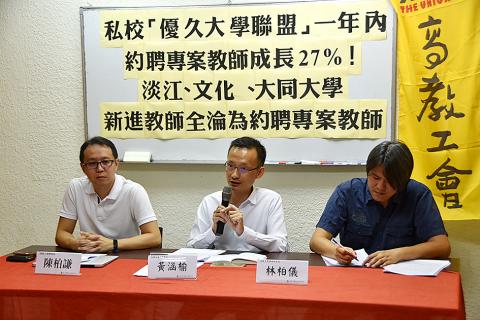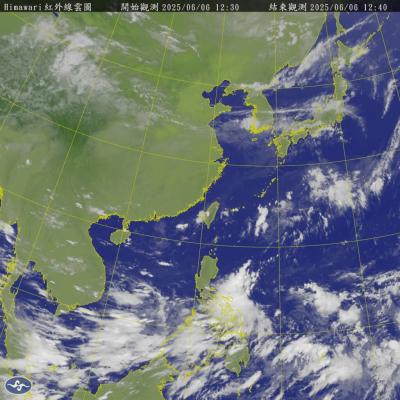An increasing number of private universities are hiring teachers as independent contractors to evade labor and education laws and exploit them, the Taiwan Higher Education Union said yesterday.
While contract teachers have long been hired for short-term projects, many universities now use them to fill regular teaching positions — such as those of instructors and tenured professors — to reduce personnel costs, union officials told a news conference in Taipei.
Statistics provided by the union showed that from 2016 to last year, the number of contract teachers at 12 of the nation’s top private universities — known as the U12 Consortium — increased by 70, or 27 percent, while the number of teachers hired as regular employees dropped by 83.

Photo: Wu Po-hsuan, Taipei Times
Many U12 Consortium members this year increased their percentage of contract teachers, the union said.
Tamkang University, Chinese Culture University and Tatung University planned to recruit 38 contract teachers for this academic year and no regulars, union researcher Chen Po-chien (陳柏謙) said.
Tamkang has new regulations stipulating that it would only hire independent contractors as instructors and assistant professors, Chen said.
“Contract teachers are usually hired on a one-year contract — or shorter — and have to renew their contracts annually. They are not protected by the Teachers’ Act (教師法), since they are categorized as non-standard staff, nor by the Labor Standards Act (勞動基準法), which does not apply to teachers,” he said.
“Schools can pressure them into doing anything, because there is no law to guarantee their work conditions and because they are afraid of losing their job,” he said.
Wenzao Ursuline University of Languages requires contract teachers to teach at least 12 hours per week, attend all of its seminars and school events, and do four hours of work at its teaching centers, Chen said.
The Ministry of Education should stipulate that the Teachers’ Act applies to independent contractors and offer concrete plans to help those whose rights have been infringed, he said.
“Protecting university teachers’ rights is a way to ensure academic freedom and students’ rights to education,” union organization department director Lin Po-yi (林柏儀) said.
When teachers’ rights are compromised, the quality of teaching and research also suffer, Lin said.
The increasing number of contract teachers is the result of the government’s “self-contradictory” policy, which ignores local academics’ needs while focusing on recruiting talent from abroad, he said.
“Taiwan has talent too. It is just that they are exploited and not given opportunities and resources. This must change, or we will never stop protesting,” he said.
As of press time last night the ministry had not responded to a request for comment.

STAY AWAY: An official said people should avoid disturbing snakes, as most do not actively attack humans, but would react defensively if threatened Taitung County authorities yesterday urged the public to stay vigilant and avoid disturbing snakes in the wild, following five reported snakebite cases in the county so far this year. Taitung County Fire Department secretary Lin Chien-cheng (林建誠) said two of the cases were in Donghe Township (東河) and involved the Taiwan habus, one person was bit by a Chinese pit viper near the South Link Railway and the remaining two were caused by unidentified snakes. He advised residents near fields to be cautious of snakes hiding in shady indoor areas, especially when entering or leaving their homes at night. In case of a

A tropical disturbance off the southeastern coast of the Philippines might become the first typhoon of the western Pacific typhoon season, the Central Weather Administration (CWA) said. The system lacks a visible center and how it would develop is only likely to become clear on Sunday or Monday, the CWA said, adding that it was not yet possible to forecast the potential typhoon's effect on Taiwan. The American Meteorological Society defines a tropical disturbance as a system made up of showers and thunderstorms that lasts for at least 24 hours and does not have closed wind circulation.

ENERGY RESILIENCE: Although Alaska is open for investments, Taiwan is sourcing its gas from the Middle East, and the sea routes carry risks, Ho Cheng-hui said US government officials’ high-profile reception of a Taiwanese representative at the Alaska Sustainable Energy Conference indicated the emergence of an Indo-Pacific energy resilience alliance, an academic said. Presidential Office Secretary-General Pan Men-an (潘孟安) attended the conference in Alaska on Thursday last week at the invitation of the US government. Pan visited oil and gas facilities with senior US officials, including US Secretary of the Interior Doug Burgum, US Secretary of Energy Chris Wright, Alaska Governor Mike Dunleavy and US Senator Daniel Sullivan. Pan attending the conference on behalf of President William Lai (賴清德) shows a significant elevation in diplomatic representation,

Credit departments of farmers’ and fishers’ associations blocked a total of more than NT$180 million (US$6.01 million) from being lost to scams last year, National Police Agency (NPA) data showed. The Agricultural Finance Agency (AFA) said last week that staff of farmers’ and fishers’ associations’ credit departments are required to implement fraud prevention measures when they serve clients at the counter. They would ask clients about personal financial management activities whenever they suspect there might be a fraud situation, and would immediately report the incident to local authorities, which would send police officers to the site to help, it said. NPA data showed